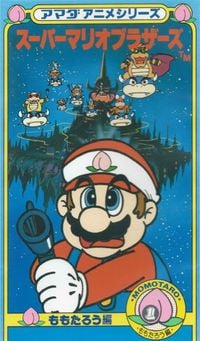Amada Anime Series: Super Mario Bros.: Difference between revisions
m (Text replacement - "]]" to "]]") |
m (Mario, Peach, Luigi, Koopa and the narrator were credited at the end but where did the rest come from?) |
||
| Line 1: | Line 1: | ||
{{another language}} | |||
{{italic title}} | {{italic title}} | ||
{{about|the three animated stories based on well-known fairy tales|the ''Mario'' animated movie|''[[Super Mario Bros.: Peach-hime Kyushutsu Dai Sakusen!]]''}} | {{about|the three animated stories based on well-known fairy tales|the ''Mario'' animated movie|''[[Super Mario Bros.: Peach-hime Kyushutsu Dai Sakusen!]]''}} | ||
[[File:Amadaseries.jpg|right|thumb|200px|The cover of ''Super Mario Momotarō''.]] | [[File:Amadaseries.jpg|right|thumb|200px|The cover of ''Super Mario Momotarō''.]] | ||
| Line 10: | Line 10: | ||
==Voice cast== | ==Voice cast== | ||
*{{wp|Tōru Furuya}} as [[Mario]] | *{{wp|Tōru Furuya}} as [[Mario]] | ||
*{{wp|Miyako Endō}} as [[Princess Peach]], [[Toad (species)|Toad]], [[Morton Koopa Jr.|Morton]], [[Wendy O. Koopa|Wendy]] | *{{wp|Miyako Endō}} as [[Princess Peach]], [[Toad (species)|Toad]], [[Morton Koopa Jr.|Morton]], [[Wendy O. Koopa|Wendy]]{{ref needed}} | ||
*{{wp| | *{{wp|Naoki Tatsuta}} as [[Luigi]], [[Papa Mario]], [[Roy Koopa|Roy]], [[Ludwig von Koopa|Ludwig]]{{ref needed}} | ||
*{{wp| | *{{wp|Masaharu Satō}} as [[Bowser|Koopa]], [[Larry Koopa|Larry]], [[Iggy Koopa|Iggy]]{{ref needed}} | ||
*{{wp|Toshiko Sawada}} as | *{{wp|Toshiko Sawada}} as the narrator | ||
==Episodes== | ==Episodes== | ||
| Line 39: | Line 39: | ||
==External links== | ==External links== | ||
*[http://www.themushroomkingdom.net/mania/anime_amada.shtml The Mushroom Kingdom - Super Mario Bros. (Amada series)] | *[http://www.themushroomkingdom.net/mania/anime_amada.shtml The Mushroom Kingdom - Super Mario Bros. (Amada series)] | ||
*[https://www.youtube.com/watch?v=BQM7Q1krPKc Super Mario Momotaro (HQ Restored Version)] | *[https://www.youtube.com/watch?v=BQM7Q1krPKc Super Mario Momotaro (HQ Restored Version)]{{dead link}} | ||
*[https://youtube.com/watch?v= | *[https://youtube.com/watch?v=7j626AryB00 All three films] | ||
{{TV}} | {{TV}} | ||
Revision as of 22:55, November 3, 2021
The title of this article is official, but it comes from a non-English source.
If an acceptable English name is found, then the article should be moved to the new title.
- This article is about the three animated stories based on well-known fairy tales. For the Mario animated movie, see Super Mario Bros.: Peach-hime Kyushutsu Dai Sakusen!
The Amada Anime Series: Super Mario Bros. (アマダアニメシリーズ スーパーマリオブラザーズ) is a series of animated stories. It is a collection of three original video animations based on fairy tales, and was released only in Japan on August 3, 1989. The series used characters and other elements from the Mario franchise in place of characters and concepts from the original fairy tales.
The series contains: Super Mario Momotarō, Super Mario Issun-bōshi, and Super Mario Shirayuki-hime. The two former episodes in the series are retellings of fairy tales of the same name, while Super Mario Shirayuki-hime is a retelling of the Western fairy tale Snow White. When the titles are read aloud by the narrator, the possessive particle の no is spoken between "Super Mario" and the name of the specific story; translated, this would render the titles as "Super Mario's Momotarō", etc.
Voice cast
- Tōru Furuya as Mario
- Miyako Endō as Princess Peach, Toad, Morton, Wendy[citation needed]
- Naoki Tatsuta as Luigi, Papa Mario, Roy, Ludwig[citation needed]
- Masaharu Satō as Koopa, Larry, Iggy[citation needed]
- Toshiko Sawada as the narrator
Episodes
Gallery
Princess Peach along with Ojīsan and Obāsan.
Mario being born from a peach.
Mario punches Roy.
Mario, Princess Peach, and seven Toads.
Trivia
- One piece of music used in the series, "New Hampshire Hornpipe," written by Dave Grusin, was originally composed for and used in the 1981 American drama film On Golden Pond.
- Another piece of music used in the series was "p:Machinery", a song recorded by German new wave/synth-pop band Propaganda.
- Some more pieces of music used in the series were "Snapshot," "Comes and Goes," and "Donna" by English avant-garde synth-pop group Art of Noise.








